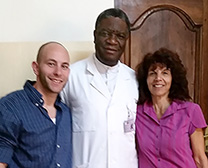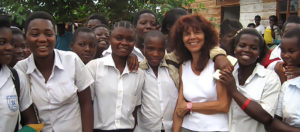I have been involved with nonprofits for over 25 years, and while I have had the privilege of working with other organizations that do extraordinary work on various important issues, there are few whose staff and leadership are as committed to the mission of the organization as those at Jewish World Watch.
JWW is made up of individuals – the board as well as the staff — who exhibit incredible passion and fervor and at the same time concern for accountability, both for the people we serve as well as the wonderful people who support our work. It is truly an honor to work with all of them.

JWW co-founder Janice Kamenir-Reznik and Diana Buckhantz with students of a JWW-supported school program in the DRC.
More than a decade ago, a congregant asked our founder, Rabbi Harold M. Schulweis, what he knew about Darfur. That question made him think about the fact that Jews had said “Never again” after the Holocaust and since then there had been Bosnia, Cambodia, Rwanda and now Darfur. Rabbi Schulweis knew exactly what to do – he called one of the most amazing women I know — Janice Kamenir-Reznik — and asked her to start an organization that would speak out against mass atrocities and genocides in the world.
Together, they created Jewish World Watch, an organization founded on the Jewish principles of “Tikkun Olam” — repairing/healing the world. But here is the part that I find so personally meaningful: while the membership of JWW is made up of more than 65 synagogues in Southern California, the work we do is not focused around Jewish causes or individuals. It is focused on helping anyone who is suffering greatly in the world – in fact our work in Chad and Congo helps Christians and Muslims.
I came from a mixed family – my mother was Christian, in fact Armenian, another population that has endured genocide and which JWW embraces – and my father was Jewish. I was brought up to believe that it did not matter what you believe, as long as you are a good person who honors and respects the beliefs of others and helps where there is need. Jewish World Watch is an organization that embodies and acts upon the beliefs my parents instilled in me.

Diana with a young student at the Farchana Refugee Camp in Chad.
I have had the privilege of seeing our projects in action in my five trips to Congo and one to Chad. It is very hard to describe what these trips are like, because words fall short when we face things that are so far beyond anything we experience in this country. It is hard to describe the abject poverty of the people juxtaposed with the incredible natural beauty of the land. It is hard to describe visiting a refugee camp where 100 mothers with babies greet us with the hope that we can help them return to their homes, or at least provide food to feed their children.
It is hard to describe the look on the face or the quiver in the voice of Martha, who was 18 and about to give birth to the baby she conceived with her rapist. At 16, Martha fled from her village because rebels were attacking it, only to be captured by the militia and held as a sex slave for months. She was able to escape only to be captured by a different group and held for several more months. Miraculously she escaped again and was helped to find her way to Heal Africa Hospital, where we met her — pregnant, suffering from trauma and fistula injury, with no family, no education, no money, no job and a baby on the way.
It is hard to describe meeting Renee, whose horribly disfigured face was a constant reminder of the day her village was attacked and she was gang raped in front of her children. After the rape, the rebels burned her house down on top of her, and one of her children died. It is hard to describe the sight of a mother and her 4-year-old daughter, after having been raped, or the 100 women ages 14 to 70 at Panzi Hospital recovering from fistula surgery — again after being raped — many living there for years at a time with no way to return to their villages and no family.

Left to right: JWW’s Director of Advocacy and Programs, Mike Brand, Dr. Denis Mukwege, and Diana Buckhantz.
But it is also equally hard to convey the resilience and hope of the Congolese people and the incredible warmth and appreciation they express for the support we provide to them. It is hard to describe how moving it was to return to a farm cooperative whose land we helped to purchase and to see how the project was changing the lives of the women in the collective.
It is equally hard to describe the emotional visit to see the land we had purchased for BVES, an organization who helps transform the lives of former child soldiers and young women who were taken as “wives” (sex slaves) of the militias. A year later a beautiful facility was being built on the land also supported by Jewish World Watch. And then there are the visits to the Sons of Congo sessions where we hear how the program is changing the way men view their wives, and their own understanding of their responsibility towards women.
Some people say there are so many problems in our own country, why should we use our resources to help people in Congo and Chad? My answer is that once you have heard their stories, once you have met the women and seen what they endure, and once you have understood that their spirit and hearts and hopes are the same as ours, you cannot turn your back on them.
It was very hard to be in Congo and to wonder how I ended up in my life, while the women we met ended up in theirs. It’s hard not to feel guilty. I understood the impulse that people often have to leave everything and move to somewhere like Congo to try to help. For most of us that is not an impulse, but there is something we can do: we can support projects that empower these women by giving them tools to rebuild their lives. This is the amazing work of Jewish World Watch, and all of you who have contributed in so many ways since its founding. Thank you.


